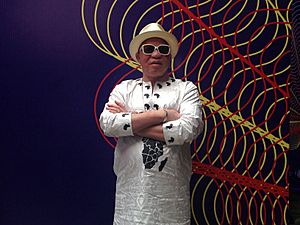Salif Keita facts for kids
Salif Keïta (born August 25, 1949) is a famous singer and songwriter from Mali. People often call him the "Golden Voice of Africa" because of his amazing singing. He comes from the Keita royal family of Mali.
Contents
Early Life and Challenges
Salif Keita was born in a village called Djoliba. He was part of a royal family that goes back to Sundiata Keita, a very important king who started the Mali Empire.
Living with Albinism
Salif was born with albinism, which means his skin and hair are very light. In his culture, some people thought this was a sign of bad luck. Because of this, he faced many difficulties and was treated differently by his family and community.
Discovering Music
Even though his family was noble and usually didn't become musicians, Salif loved music. He started pursuing music when he was a teenager. This decision made him even more different from his family's traditions.
In 1967, he moved to Bamako, the capital city. There, he joined a band called the Super Rail Band de Bamako. Later, in 1973, he joined another group called Les Ambassadeurs.
Moving to Ivory Coast
Because of political problems in Mali, Salif and his band moved to Abidjan, Ivory Coast in the mid-1970s. They changed their name to Les Ambassadeurs Internationaux. This band became very popular around the world, and Salif soon started his own solo career.
Salif Keita is also the father of Nantenin Keita, a talented Paralympian athlete.
A Golden Career
After moving to Ivory Coast, Salif Keita and his band worked hard. They became more and more popular. Their album Mandjou, released in 1978, became a huge hit in West Africa.
International Success
In 1984, Salif moved to Paris, France. He wanted to share his music with even more people. His music mixes traditional West African sounds with influences from Europe and the Americas.
His album Soro, released in 1987, was his big international breakthrough. It featured traditional Malian instruments and sounds, like balafons and djembes, along with modern instruments like guitars and synthesizers.
Salif Keita performed at the Nelson Mandela 70th Birthday Tribute concert in 1988. This concert helped call for Nelson Mandela's release from prison.
Returning Home
After finding success in Europe, Salif returned to Bamako, Mali, in the early 2000s. His album Moffou (2002) was very well-received. He was so inspired that he built his own recording studio in Bamako. He used this studio for his 2005 album, M'Bemba.
Many famous musicians have played on Salif Keita's albums, including Carlos Santana.
Music for a Cause
Salif Keita's album La Différence came out in 2009. This album is special because it's dedicated to people with albinism around the world. Salif has always spoken out for them. In one song, he sings about how "difference" is beautiful and that everyone deserves love and respect.
La Différence won him a big award: the Best World Music 2010 at the Victoires de la musique.
In 2001, his song "Tomorrow" was featured in the Will Smith movie, Ali.
Retirement and Return
In November 2018, Salif Keita announced he would stop recording new music. His album Un Autre Blanc, released at that time, was meant to be his last. He invited many other African singers to join him on one of the songs.
However, in April 2025, Salif Keita surprised everyone by releasing a new album called So Kono. This was his first album in seven years, showing that his passion for music is still strong.
Salif Keita has released over 15 albums. He often uses traditional African instruments like the djembe, kora, and balafon in his music.
Albinism and Advocacy
As a person with albinism, Salif Keita faced many challenges growing up in Mali. His condition was sometimes seen as an illness. Even though his family had a history of musicians and warriors, he was not allowed to pursue music. This led to him being disowned by his father and leaving school.
He moved to Ivory Coast to follow his dream of music. He became a cultural icon, known for his talent and his voice. After becoming famous, he returned to Mali in 1997. He continues to be a strong voice for people with albinism, showing that being different is beautiful.
Selected Albums
- Soro (1987)
- Ko-Yan (1989)
- Amen (1991)
- Folon (1995)
- Papa (1999)
- Moffou (2002)
- M'Bemba (2005)
- La Différence (2009)
- Talé (2012)
- Un Autre Blanc (2018)
- So Kono (2025)
Images for kids
See also
 In Spanish: Salif Keïta para niños
In Spanish: Salif Keïta para niños
 | Janet Taylor Pickett |
 | Synthia Saint James |
 | Howardena Pindell |
 | Faith Ringgold |




